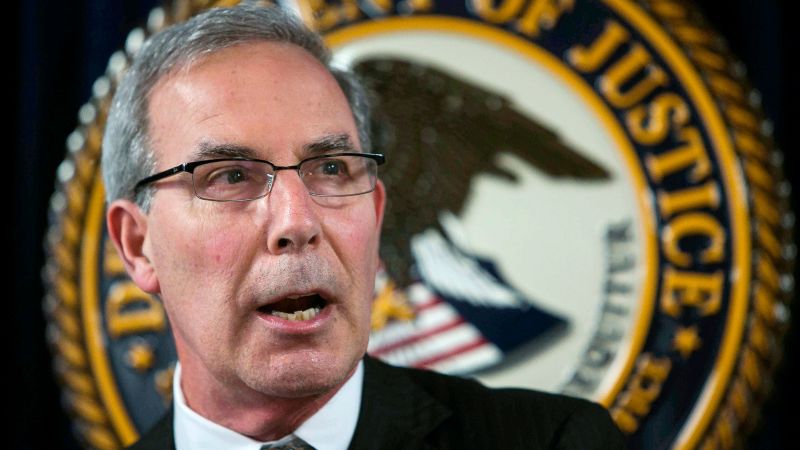The special counsel overseeing the Hunter Biden federal criminal investigation, David Weiss, is scheduled to testify in front of the House Judiciary Committee for a highly anticipated voluntary interview Tuesday, as House Republicans continue to allege there was political interference in the criminal probe into President Joe Biden’s son.
The closed-door interview is expected to cover the scope of Weiss’ authority, which has faced intense scrutiny since whistleblowers with the Internal Revenue Service raised questions about Weiss’ ability to bring charges.
It is rare for a special counsel, or any top prosecutor, to testify to Congress in the middle of an investigation – and the Justice Department has already signaled that some questions will be out of bounds. But given the nature of the politicization allegations, and the way House Republicans have used them to fuel their impeachment inquiry into the president, the Department of Justice made Weiss available to testify.
IRS whistleblowers Gary Shapley and his deputy, Joseph Ziegler, alleged in their own House testimony in June that the Justice Department put up a number of roadblocks throughout Weiss’ investigation, including that Weiss was not the deciding person on whether charges against Hunter Biden were filed and that Weiss had requested special counsel authority but was denied. Weiss has disputed these allegations in letters to lawmakers, as did Attorney General Merrick Garland at a recent public hearing.
Ahead of Tuesday’s private interview, a spokesperson for Weiss, Wyn Hornbuckle, said in a statement to CNN that Weiss will be testifying voluntarily about the “scope of his authority” and reiterated that he will prepare a public report at the close of his investigation.
“Mr. Weiss is prepared to take this unprecedented step of testifying before the conclusion of his investigation to make clear that he’s had and continues to have full authority over his investigation and to bring charges in any jurisdiction. Consistent with department policy and the law, he will be unable to address the specifics of his investigation,” Hornbuckle said.
Central to the whistleblower allegations is a key meeting on October 7, 2022, between FBI and IRS agents, Weiss and other Justice Department prosecutors. Shapley, who attended the meeting and worked on the case, provided his notes on the meeting and email exchanges to Congress to back up his allegations. This is the meeting where, according to Shapley, Weiss said he didn’t have final charging authority in the Hunter Biden probe.
Since the allegations first came to light, Congress has interviewed at least seven individuals from the DOJ and IRS who were also involved in the investigation, many of whom have also cast doubt on a number of the key allegations.
Weiss has since written to Congress that he was “granted ultimate authority” on the case and that he never requested special counsel status in the timeframe Shapley alleged, but rather he explored becoming a “special attorney” under a different statute.
Weiss, who was appointed as the US attorney in Delaware by former President Donald Trump, began the probe in 2018 and was granted special counsel status in August after plea talks between the Justice Department and the president’s son to resolve tax and gun charges fell apart. The GOP had criticized the plea deal, accusing Weiss of giving Hunter Biden preferential treatment.
In September, Hunter Biden was indicted for lying on federal firearm forms and illegally possessing a firearm while using illicit drugs, and he pleaded not guilty in October.
By naming Weiss as a special counsel, Garland gave him further independence from the Justice Department as he prepares for an unprecedented trial against the son of the sitting president, and as Republicans claim the department is politicized.
Federal prosecutors have spent five years investigating Hunter Biden for potential felony tax evasion, illegal foreign lobbying, money laundering and other possible crimes. House Republicans have been investigating Hunter Biden’s foreign business dealings and whether the president himself committed any impeachable offenses – a key hurdle that they have yet to overcome.
The tax investigation is still underway, and Weiss has said in court filings that charges may be coming. The IRS whistleblowers said they recommended felony tax charges stemming from Hunter Biden’s lucrative business dealings overseas. Hunter Biden denies wrongdoing, and even though he was late with his federal taxes, he eventually paid off his $2 million debt in full.
There is some precedent for Weiss’ high-stakes meeting with lawmakers.
Former special counsel Robert Mueller, who investigated connections between Trump’s 2016 campaign and Russia, met privately with lawmakers at the start of his probe in 2017, though it wasn’t a transcribed interview. But Jack Danforth, who in 1999 led a special counsel probe into possible government wrongdoing at the deadly Waco, Texas, standoff, issued an interim report and publicly testified to Congress amid his investigation.
CNN’s Marshall Cohen contributed to this report.
Read the full article here
